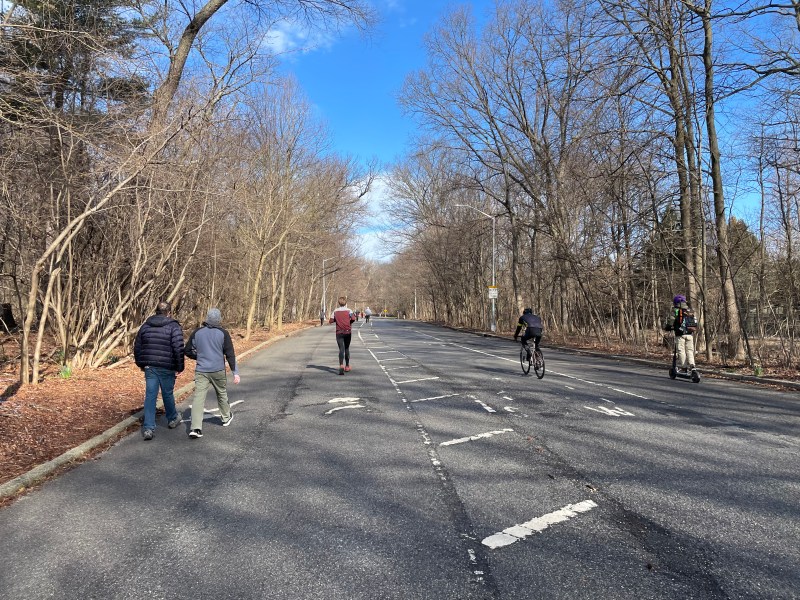New Prospect Park Road Redesign Paves the Way for Central Park

They’re paving the way to safer parks.
Prospect Park’s East Drive will get a long overdue makeover starting this month — creating a possible model for redesigns of Central Park and other outdated, car-centric park roads.
Beginning March 12, the pothole-strewn two-mile eastern stretch of the main loop of Brooklyn’s marquee park from Park Circle north to Grand Army Plaza will get its first repaving in a decade — followed by new paint in a new formation.
Under the new design, people on bikes will share a 16-to-18 foot lane with “authorized vehicles,” flanked by two separate pedestrian lanes — one 13-to-14 feet wide, the other six-to-eight feet wide. That replaces the current design, which gives 12 feet for pedestrians alongside two 10-foot roadway lanes — one of which is officially designated for motor vehicles, but mostly used by pedestrians and cyclists:

In the East Drive’s current pockmarked state, cyclists must contend with bumpy roads, potholes and gashes where puddles form when it rains. The prospect of better terrain had local elected officials promising to put their running shoes on this year.
“Prospect Park is a treasure for Brooklyn and everyone in New York City,” said state Sen. Zellnor Myrie (D-Crown Heights). “I can’t wait to test out the repaved road myself at the annual Turkey Trot.”
The new paint job will be finished in about five weeks, according to a press release. If all goes well, officials plan to extend the design to entire loop after what the city bills as an 18-month pilot.
Officials rejected an alternative design concept that would have put a single large pedestrian space next to two bike lanes — one for slow-riding and the other for faster bikers.
The two-bike-lane option wouldn’t allow pedestrians to walk on the outer edge of the roadway, which they have to do to get in or out of the park, according to an outside study done on the city’s behalf by Sam Schwartz Associates.
DOT officials will assess the redesign’s effectiveness through feedback from park visitors, they said. The Prospect Park Alliance is collecting input on the pilot on its website.
But the effort may be pre-baked against cyclists. Private vehicle traffic is banned from the East and West drives, but Parks, NYPD and the occasional scofflaw continue to use the roadway.
The Alliance’s feedback form, however, focuses entirely on the dangers caused by fast cyclists — while neither it nor the Schwartz study mention dangerous drivers like this Ohio flyer who cuts through the park many mornings:
This SUV with Ohio plates illegally cuts through Prospect Park every morning at around 8:45-9:15am and speeds the entire time to avoid traffic on Flatbush Ave and Ocean Ave on his way to Eastern Parkway #bikenyc what can be done to stop him? pic.twitter.com/orUczFz0Bq
— Alpha Numeric (@threechordme) February 11, 2023
City officials claimed their new design would emphasize to drivers that the park is closed to private vehicles.
If successful, the project could have wide-ranging implications for the rest of the city. In Central Park, the city and the Central Park Conservancy are trying to figure out how to improve safety on the park loop, which was once a busy city roadway before cars were officially banished to create a thriving-but-packed road full of pedestrians, cyclists, pedicabs and horse carriages. One of the newest executives on Mayor Adams’s team noted that improving the roads inside parks is one of the main ways the city is figuring out to how better use public space.
“Mayor Adams has charged us with finding new and creative ways to increase public space across New York City,” said Chief Public Realm Officer Ya-Ting Liu. “Re-examining how we design the roads in our park system is a perfect example of how we’re advancing the Mayor’s vision for quality public spaces throughout the city.”
Parks officials are looking at other long-term policy and design changes in the park, they said — including the possibility of adding more colorful crosswalks and putting in traffic signals that specifically pertain to bikes — and exploring possible resolutions to the city’s prohibition on e-bikes in its parks.
They did not say whether they considered making the park completely car-free.